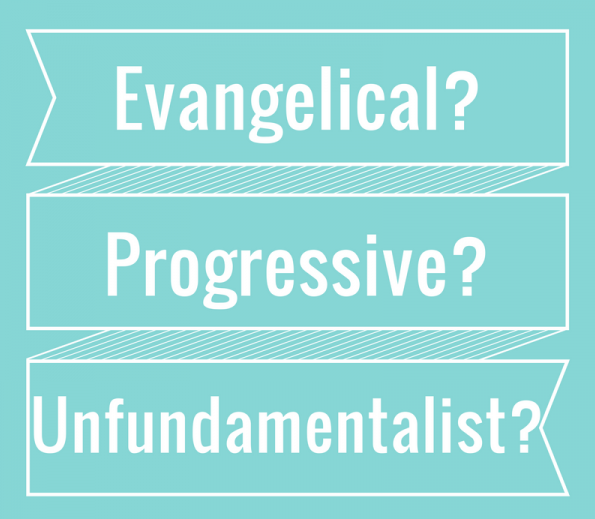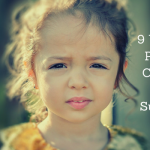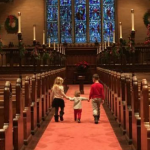
Image: Canva
Most people are shocked I still identify as an evangelical given that I have shifted in my faith so drastically and publicly—from a hardcore missionary in a restricted access country to now a progressive Christian blogger.
I know many are tired of conversations about labels, believing labels to be the reason why people are frustrated with institutional religion and why can’t we all just be one big happy human family anyway? However, I find it a worthwhile conversation to rehash for two reasons. First, because I write about faith, it seems only fair and “on-brand” if I provide my readers a context from which I operate. It feels important to provide an explanation of the lens through which I do my thinking and writing about faith online. Second, as a writer, words are my jam. I find the science of language fascinating, how each word carries ideas and over time the form changes and the content evolves. I love how language has to have mutually agreed upon meaning for us to establish civil conversations and not combust into chaos, Tower of Babel style; and yet at the same time it maintains a fluidity so that as history progresses it shifts to maintain relevancy. Kind of like religion.
You could describe the three labels I’ve titled this blog post to be my chronological faith progression. I was converted into evangelicalism, became a progressive, and now I blog at a place called Unfundamentalist Parenting. Although this would be true, the labels I wear are a little more complicated than this time continuum.
I need the most therapy to sort out my relationship with evangelicalism. Evangelicalism is my home. It’s my faith birth place, my nuclear family where I developed all of my quirks, issues, and dysfunction. It is where I learned my heart language, the prayers and Steven Curtis Chapman lyrics that still bubble up within me spontaneously at all my critical spiritual moments. It is also where I have been most wounded, because the pain of life arrived in my most tender and vulnerable years of childhood/adolescence via the evangelical establishment.
I have the most nuance for evangelicalism. When the world reads media headlines like, “the majority of evangelicals support Trump,” or some otherwise equally embarrassing correlation, I am eager to cast doubt and tease out the nuances of media portrayal versus reality. This is because evangelicals aren’t simply news headlines for me, they are my friends, community, and network.
Evangelicals are not just my close associations, evangelicalism is part of my faith DNA. I can say I am no longer evangelical as much as I can say I am no longer Chinese. It is not possible, I will always be Chinese, it is in my blood. One might argue ethnicity is not quite the same as a faith proclamation: one is a biological reality and the latter is a choice. I suppose I can’t see it that way because of how I view faith formation, especially when it happened in my coming years of age. The influences that shape our childhood aren’t so easily extricated because it intertwines into the fiber of our being, and I feel it’s better to acknowledge and validate this instead of constantly struggling against it.
But I’m afraid evangelicalism is not as into me as I am into it. I have some serious contentions with some of its central tenets, and the evangelical establishment has a tendency of defining membership by adherence to doctrinal standards. So I constantly feel marginalized and edged out of the faith community I called home for so many years. And it is here at the margins of evangelicalism that I wrestle, criticize, and speak my truths. I have earned a right to speak into evangelicalism—I was forged in the fires of Bebbington’s Quadrilateral. To engage with evangelical thought and movement is for me to stick squarely in my own lane.
However, I also love and cherish my short blip on earth too much to stick around where I am unwanted. It is only human for me to invest my energies where I am welcome, and I have found that cozy little space in progressive Christianity. I am not unaware of the problems in brogressive Christianity, the little play on words highlighting the patriarchy that infects the movement. It is a space dominated, despite some commendable efforts, by white men. Nevertheless, I align with the doctrinal stances of progressive Christianity much more closely. To simplify a great deal, I am far more comfortable with a reimagining of the atoning work of Jesus on the cross, a concern for systemic injustice, a broader hermeneutical lens beyond literal Scriptural readings, and you know, God is sometimes referred to as She and I don’t complain about that.
Finally, what is up with this unfundamentalist business? What does that mean and why are you using it, and why didn’t you think of how hard it would be to hashtag when you decided to build your platform and book around it? <==Questions I ask myself. I came up with the term unfundamentalist when I my wrote my blog series on parenting, and I thought I was a snowflake genius until I realized there was a page with (at the time) more than 50,000 followers with the exact same name.
The reason I chose this label is because I wanted to clearly portray an endeavor to deconstruct the toxicity of faith, especially because I was reaching back to my own childhood. It had to be UN-something because the work I was doing was to name a thing and say this thing is not okay. Specifically, the things I felt were dangerous to children were the spiritual manipulation of fear tactics, threat of hell, imposition of power by authority figures, and an unforgiving drawing of doctrinal boundaries. I wanted to combine my theological work with what faith is as well as what faith isn’t.
I am doing my best to create something new, to forge a path forward for the next generation in faith. I want to cast a vision for what families could look like if we cultivate a spirituality that infect the world with love instead of division. But I recognize this means confronting the power structures in religious establishments who will not let go of power easily. The fortress where religious authorities reside, heavily guarded by orthodoxy gatekeepers, needs to be given a strong, formidable name: fundamentalism. And then I want to do whatever is the opposite of it.
If I were to sum up unfundamentalism in one short phrase, it would be this: to give away power. Unfundamentalist religion is to care for those without power. Unfundamentalist Christianity is to walk in the ways of Jesus, who gave up his power unto the cross. Unfundamentalist parenting is to transfer power parents have as adults over to our children.
Glennon at Momastery asks this question in a recent podcast,
“Who is power forgetting?”
The answer to this question is where I want to spend all the rest of my days.
Sign up here to get updates on Unfundamentalist Parenting.
Join our Facebook Group, Raising Children Unfundamentalist.












